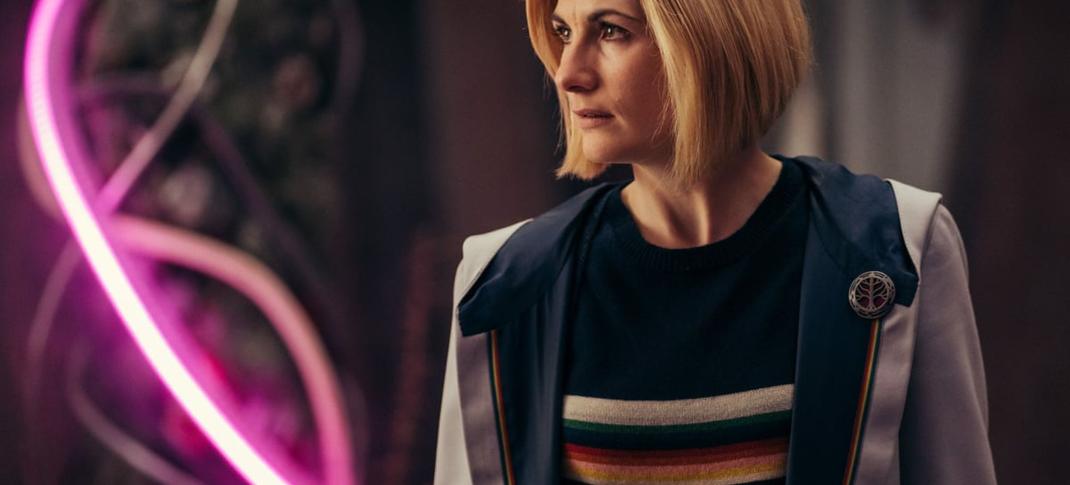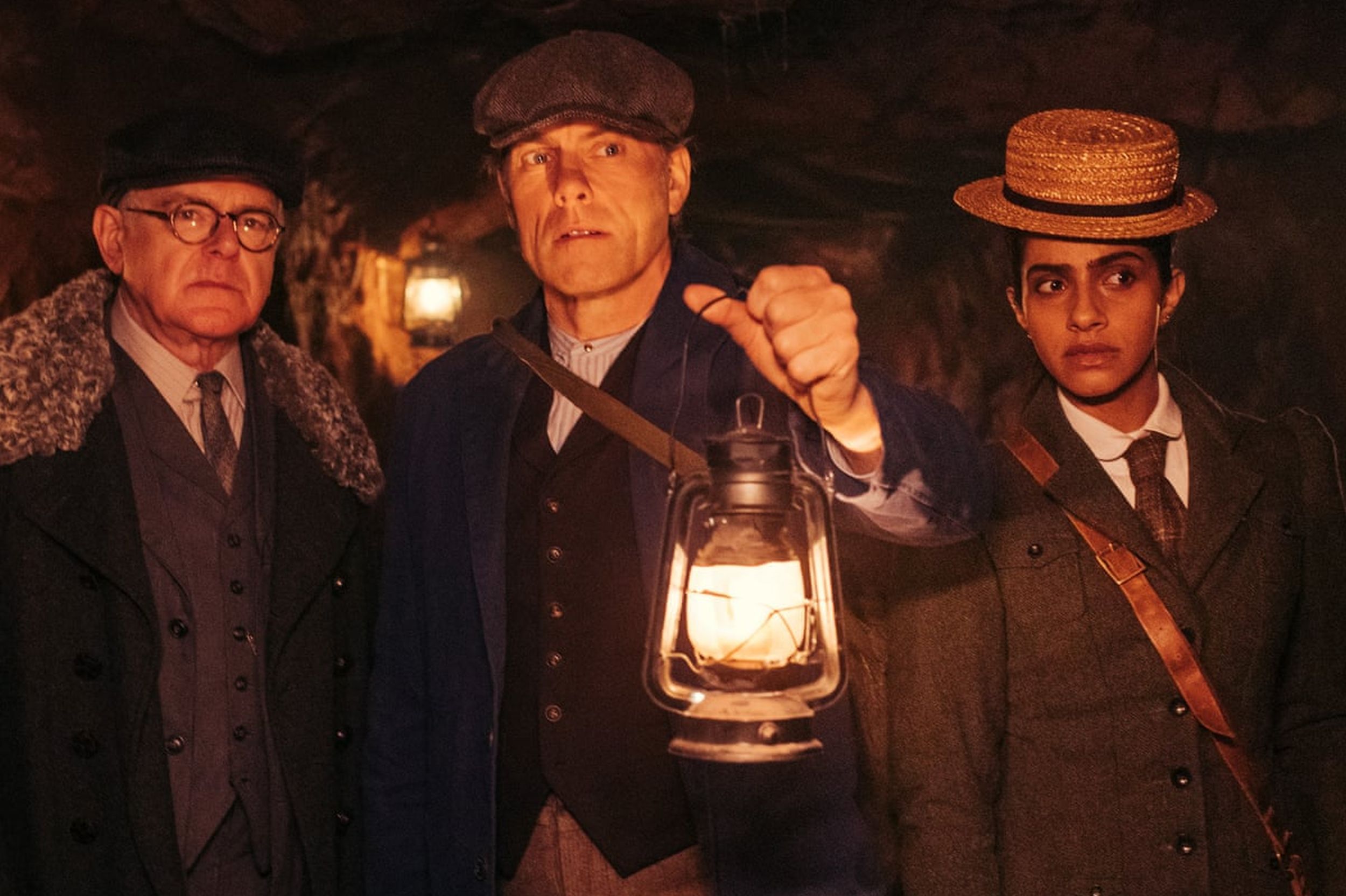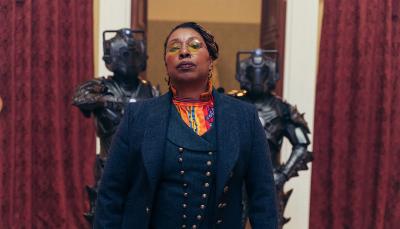'Doctor Who: Flux' Episode 5 Recap: Survivors Of The Flux

During the Steven Moffat era, a specific type of Doctor Who episode became a hallmark: The zany romp. Exemplified by installments such as "A Good Man Goes To War," "Let's Kill Hilter," and "The Wedding of River Song," these episodes would arrive filled with a madcap energy jokes-a-minute attitude and conclusions creating time paradoxes. They were both great and terrible, hours that were fun as hell to watch, yet couldn't withstand a minute of scrutiny, lest they collapse in a puff of logic.
Jericho: Come this way, away from the imminent explosion.
Since the beginning of Doctor Who: Flux, it has felt like showrunner Chris Chibnall is desperately grasping to recapture the quirky energy of that era. Not by chance, the last time I thought this was last season's episode "Fugitive of the Judoon." It, at least, had a solid twist premise embedded in it, the reveal of Ruth-Doctor and the controversial idea the Doctor has lived for more than 13 lives, with multiple regenerations missing from her mind. Nor do I think it a coincidence this run of episodes marks the first return of Ruth-Doctor. Chibnall seems to be trying to capture the same screwball spirit for his temporal loop-de-loops.
But three seasons in, and fans have seen what Chibnall is good at in the Doctor Who universe, and it's not that. Episodes like "Rosa," "Demons of the Punjab," and "The Haunting of Villa Diodati" capture the historical lessons of the original Doctor Who spirit of educational TV while also being fascinating time travel stories watchable by all ages. "Arachnids in the U.K." and "Nikola Tesla's Night of Terror" are fun pointed lessons about our world with aliens thrown in. Where Chibnall fails is in stories like "Spyfall" and "Kerblam," the nutty weirdo romps.

That Chibnall has chosen to lean into the exact type of story he's not good at for the Doctor's final six episodes is a mystery most likely to remain unsolved. But this episode, and its multiple disjointed recursive plotlines, was quite possibly the worst episode of the season so far, and that's saying a lot after Episode 3. There are good ideas. The Doctor as an Angel is a great image, though the show did nothing with it. The Lupari, as a race, are fun. The Williamson Tunnels are real, and tying them in as part of Dan's story isn't a lousy notion on paper. And I am always here for a love story like Bel and Vinder's, even though, like the Grand Serpent, I have no idea what they're doing in this story about the Flux.
The infiltration of UNIT by the Grand Serpent, re-writing Doctor Who's past and crisscrossing the present Doctor's predicament with Classic Who, was a brilliant notion. It was also a chance to throw in Easter eggs galore, including references to the First, Second, and Third Doctor adventures. The late Nicholas Courtney, who played Brigadier Lethbridge-Stewart from the late 1960s to 2008 in The Sarah Jane Adventures, was heard off-camera in a line pulled from an early Third Doctor episode. The "Post Office Tower" business UNIT missed is 1966's "The War Machines," a First Doctor story. And UNIT was shut down in Doctor Who lore in 2017 due to austerity measures. But why on Earth did the series insert it here instead of giving it a whole episode?
Yaz becoming her own Doctor is so overdue, it's criminal the show didn't give her a whole hour. The Yaz thread, which I mentally entitled "WWTDD?" plays to Chibnall's strengths: history stories that teach and entertain. Yaz living every companion's worst nightmare, losing the Doctor with no way home, should have been a stand-alone adventure like when it happened to Amy in "The Girl Who Waited." The scene where she watches the Doctor's message for the 47th time, reacting where she knows she's supposed to, was heart-tugging gold. Mandip Gill, John Bishop, and Kevin McNally were great together, with Dan and Jericho as supportive companions. So why was it one thread of six smashed into a single barely coherent episode?

Now, I am a defender of the Timeless Child storyline; I thought it a fascinating development. Furthermore, I have defended the idea of untapped past Doctors and regenerations of regenerations, opening up new avenues of storytelling to be fleshed out. And I love an Ood. But everything about Awsok-is-really-Tecteun, the Doctor's evil mummy who runs Division, was just so hammy, so painful, so frustratingly dumb, it ruined just about everything, even her gorgeous faux TARDIS central control with the cherry tree.
The show has never given me a reason to give a good goddamn about Division. It feels tacked on, an afterthought of what to do with Ruth-Doctor, to make her not-so-sympathetic to audiences. Worse, the whole thing comes after another Doctor Who-esque show did the same story only a few months back. Marvel's Loki was all secret controlling bureaucracies outside the timestream and whose female lead felt like a tribute to Jodie Whittaker. I understand the multiverse is having a moment in sci-fi/fantasy right now, but Doctor Who should be leading the way on this topic, not following.
And then there's Swarm and Azure, who since the beginning felt like something borrowed from the worst aspects of Classic Who and haven't improved one jot. The idea of Passenger isn't bad, but it's a tad predictable, especially now both Dan's love interest Di and Vinder are trapped within it together. Perhaps putting Bel and Tigmi with Karvanista instead of Swarm and Azure will help make them feel more relevant. But there's still too much going on and five characters too many to care about properly. (The Sontarans are back again, lovely.)
Even though we all know the Doctor will pull it out because she always does, it's never felt more rote as it does right now. Maybe the finale will find a way to make it worth it, but as the first female Doctor's final episodes, I've never been more disappointed.




